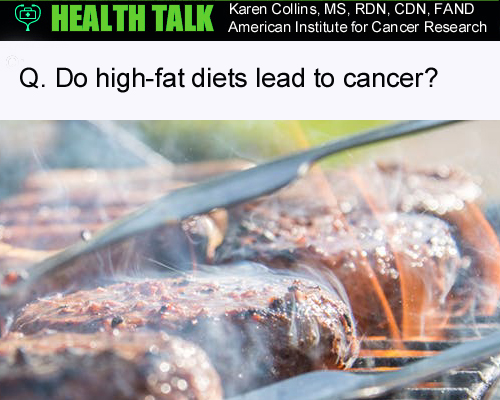Q. Do high-fat diets lead to cancer?
A. Not necessarily. That’s a common concern though: The most recent AICR awareness survey shows that more than 4 in 10 people think that high-fat diets can be a cause of cancer. However, whether your diet is higher or lower in fat, it’s your overall eating choices that matter to reduce your risk of cancer.
Early research on diet and cancer risk did suggest a link to fat consumption, since countries with low fat intake (for example, Japan) had lower rates of cancer than countries (like the U.S.) with higher-fat diets. After further study, when scientists followed people over time and adjusted for other eating and lifestyle choices, differences in cancer risk no longer seemed related to fat consumption.
So what does today’s best science tell us about dietary fat in the big picture of healthy eating choices to help prevent cancer?
- Limit fat from red meats, especially processed meats. High-fat diets can mean diets high in fatty, processed meats. Eating too much red meat (beef, pork and lamb) and processed meat increases risk of colorectal cancer – the third most common U.S. cancer. This risk seems related to other compounds in those meats, not the fat.
In addition to reducing colorectal and stomach cancer risk, limiting red and processed meats is recommended for heart health.
- Make plant foods the focus. Center your meals and snacks around vegetables, fruits, whole grains and beans, which offer a wide range of nutrients, protective phytochemicals and dietary fiber.
Fat is the most concentrated source of calories, so if most of the foods you eat are high in fat it’s easy for relatively small portions to add up to excess calories. If those extra calories lead to weight gain, that is a very real concern for cancer risk, given that overweight and obesity are a cause of 11 cancers.
- Don’t be fat-phobic. You don’t need to steer clear of plant foods like nuts and avocados that are naturally high in fat. Although they are concentrated in calories, portions appropriate to your overall calorie needs will not derail weight management, and provide valuable nutrients while making healthy eating delicious.
Studies have found that low-fat diets are no better than other calorie-cutting diets for weight loss or avoiding weight gain. It’s consuming calories beyond what your body needs that leads to weight gain, whether those extra calories come from high-fat foods, high-sugar sweets and drinks, or excess portions.
- Enjoy healthful oils to flavor foods while keeping total calories in check. With hunger-satisfying eating patterns that include abundant vegetables, modest amounts of oil don’t send total daily calories over the top. On the other hand, chips, cookies and ice cream (whether low-fat or high-fat) are “special occasion” foods in true Mediterranean-style eating.
From a health perspective, all fat is not the same. Even within categories of saturated and unsaturated fats, specific fatty acids (the building blocks of fat) may differ in how they promote health or bring potentially negative effects on insulin function, inflammation, heart health and cancer risk. Research is still in progress to provide clearer answers to these questions.
Removing fear of fat does not mean giving a green light to all high-fat foods. Focus on overall quality of foods you eat to promote health and reduce cancer risk.
The Author:
AICR HealthTalk is by Karen Collins, MS, RDN.
